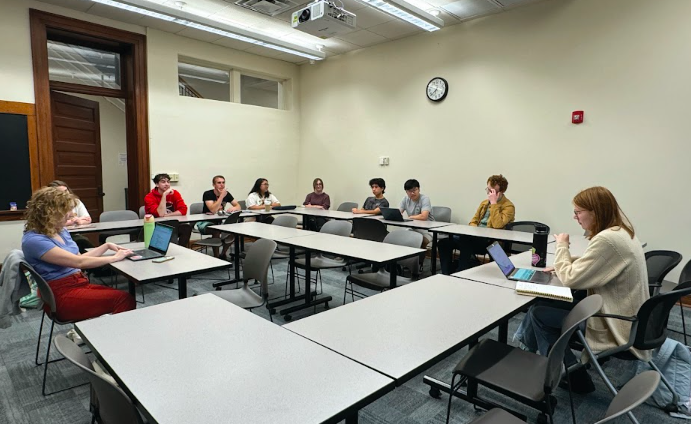Ella Kitchens, Staff Writer–
The Green Team meets weekly to address environmental sustainability on campus, tackling a broad spectrum of issues.
Their efforts range from organizing composting initiatives to collaborating with other student organizations and the Denison administration. With a constant flow of ideas and projects, the Green Team always has meaningful discussions at the forefront.
Jeremy King, Denison’s Director of Sustainability and Campus Improvement, frequently partners with Green Team to combat environmental issues. The question, King said, is “how do we get sustainability front and center in a meaningful way?”
“We’re trying to reach the campus not necessarily about a singular issue, but rather about small ways people can become more involved with sustainability in their own lives,” said Summer Rodgers, secretary for Green Team. Rodgers keeps track of the organization’s projects and progress, as well as keeping everyone up to date during weekly GenBod meetings.
While Green Team often focuses on spreading awareness, they also collaborate with other student organizations on campus. An upcoming collaboration is a Halloween event with Revival Thrift, an upcycling club. The event is scheduled for 5-7 p.m. Oct. 11. on the third floor of Slayter.
Not only does Green Team collaborate with student organizations, but they also work with Denison’s sustainability office. This year, they have started a composting program for senior apartments, due to them cooking in their own kitchens. Seniors can store food scraps and compostable material, and composting liaisons pick it up for them. While the program is only available for senior apartments, liaison is a paid position open for any Denison student.
“Sometimes it’s hard to get people really passionate about something,” Rodgers said. “We typically go where people want to go. We are a club that tries to run based on the community values.”
Green Club’s programs and events provide opportunities for Denison students to be engaged even if they are unable to make the weekly Thursday meetings.
“If members want to focus on specific initiatives, they can,” said Tara Sefchick, community liaison for Green Team. “But if they want to hear a little about everything, they also can.”
Green Team’s collaboration with Denison’s administration continues beyond the sustainability office. The administration’s goal is to have net zero carbon emissions by 2045. This means that they hope to physically eliminate all carbon emissions on campus. Recently, Green Team’s focus has shifted to include Denison’s Net Zero goal. This led to the founding of the Net Zero Project branch of the club.
“We are students who are very excited about the goal to reach net zero carbon emissions by 2045,” Charlotte Meyer, the leader of the Net Zero Project said. “We want to work closely with the administration to reach their goal and communicate about it to students.”
Green Team wants to help the administration as they figure out how to shift to net zero in the next 20 years. They also want to promote communication with students about this initiative, as many are unaware of Denison’s Net Zero initiatives.
“We want to emphasize education this semester and teach students about what Denison’s net zero goals are and what they mean,” Meyer said.
“The Green Team–administration relationship is very important. When the two come together, it’s a beautiful thing,” King said.
This is not the first time that Green Team has worked with the administration to create meaningful change. Green Team’s efforts led to plastic water bottles being removed from Slayter, and spreading awareness that plastic cannot be recycled on campus.
With the complexity of so many environmental issues, knowing where to start can be difficult. Green Team and the Denison sustainability office understands this more than anyone.
Meyer described a ride along she had with the recycling collector at Denison that changed her view of how her waste could impact our world.
“I got to see the place where they sort the recycling. It’s called the Big Red Barn, and it’s down the hill. And there are people in that facility who sort all of the recycling we put in the recycling bin… if I toss an apple core into the recycling bin, those people are going to touch it.”
She stressed that “even if you don’t see where it’s going, [your waste] will still impact people. It made me think about how little we think about the things we don’t see.”

